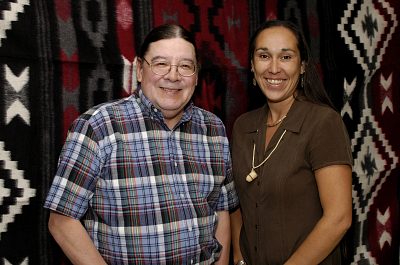August 4, 2005
Two among ‘top minorities in science’ for 2005
Polly Olsen, director of the School of Medicine’s Native American Center of Excellence, and Dr. Walter Hollow, the first director of the center, have been named among the top minorities in science for 2005 by Science Spectrum magazine. Sixty-five others, representing a wide range of institutions and scientific interests, were also named as “Science Spectrum Trailblazers.” They will be honored at a luncheon on Sept. 16 in Baltimore during the Minorities in Research Science Conference. Both the conference and the magazine are produced by Career Communications Group, Inc.
Hollow, clinical associate professor of family medicine, earned his medical degree from the UW in 1975, and was the first Native American to do so. He was among the founders of the Seattle Indian Health Board, and after finishing his residency in family medicine, he became medical director there. He worked at Group Health Cooperative, beginning in 1981, as a family medicine physician and a psychotherapist, both at the Northgate and Ballard clinics. He returned to the UW in the early 1990s to join the Department of Family Medicine and develop the proposal for the Native American Center for Excellence. He continues to see patients at the Seattle Indian Health Board and at Group Health, and is now at the UW one day a week.
Hollow is also the founder of the Medicine Wheel Society, which began as an informal support group, and now includes Native American faculty and students from several schools, as well as undergraduates. In 2004, he received the UW Medicine Alumni Association’s Humanitarian Award. He has also been honored by the King County Medical Society as Clinical Teacher of the Year and by the Association of American Indian Physicians as Physician of the Year. He has been a longtime member of the Association of American Indian Physicians and was president of the organization from 1979-81. He is a member of the Fort Peck Assiniboine-Sioux Tribe in Montana, where he was born.
Olsen is a member of the Yakama Tribe of South-Central Washington and graduated from the UW in 1994 with a degree in cultural anthropology. Before joining the School of Medicine’s Office of Multicultural Affairs in 2001, she had been teaching classes in Native American culture for urban Indians in the public schools. She became interim director of the Native American Center for Excellence in 2002 and was named director in 2004.
She has overseen the center’s Indian Health Pathway, a series of related courses and clinical experiences open to both Native American and other medical students. She has also worked to recruit and retain Native Aemrcian students, who now number 15 in the medical school, and has developed relationships with tribal communities throughout the region.
Along with supporting current Native American medical students, the center has programs for undergraduates considering medical school and for entering students. Instruction is offered in tratitional Indian medicine, and clinical opportunities are available for medical students to work with Native American and Alaska Native populations in rural, urban and reservation clinics throughout the Northwest. Recently, Olsen has been offering workshops in cultural competency for health care professionals who want to work more effectively with Native American patients.
The two were surprised to hear of their selection as “Trailblazers,” since they did not realize they had been nominated. Olsen plans to attend the celebtation in Baltimore.



